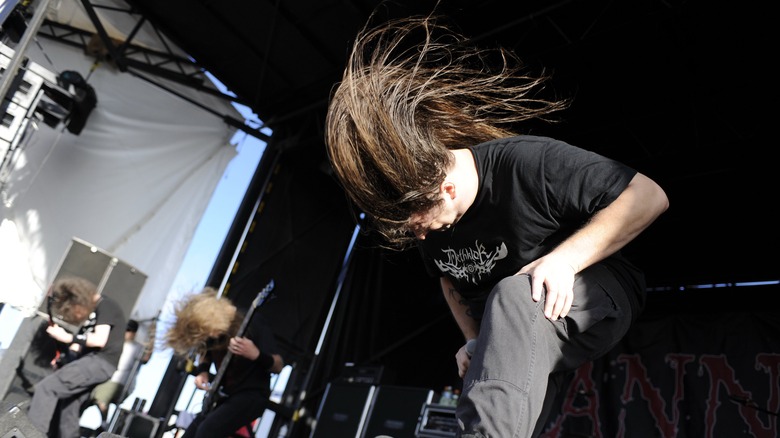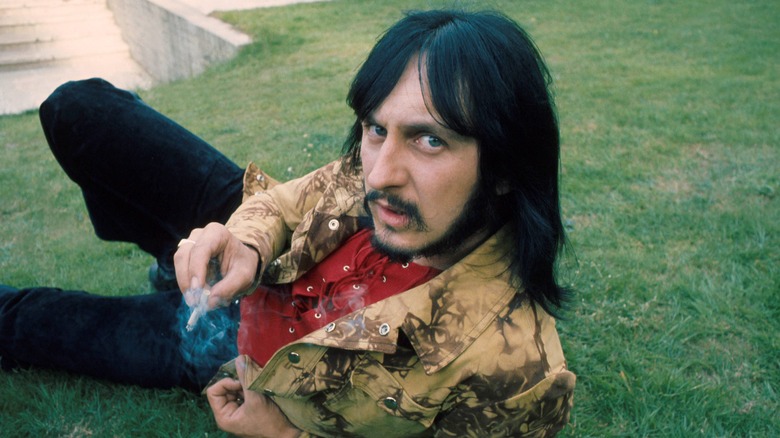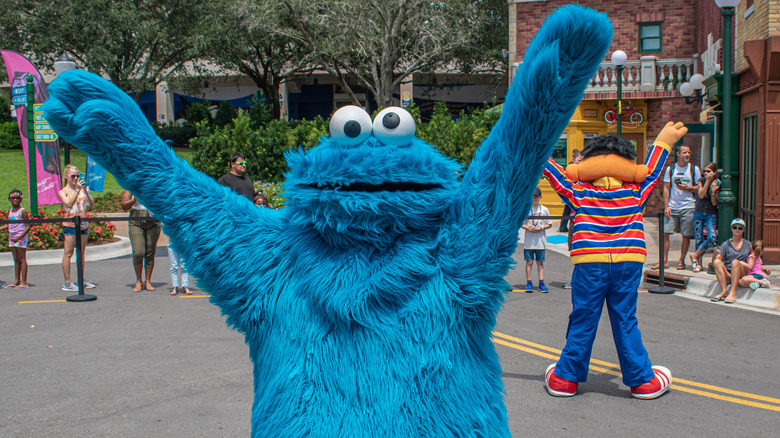The First Song Written By This Classic Musician May Have Built The Template For Death Metal
One of the key qualities that sets death metal apart from other genres of music is the singers' ability to work "death growls" into their vocal repertoires. According to a 2006 article from The Wall Street Journal, this type of vocalization, which emphasizes a harsh, guttural, gravely delivery, is also known as "Cookie Monster vocals." The unlikely source undertook an investigation of how this sort of singing works, and research included contacting a representative from Sesame Workshop, the nonprofit organization that oversaw the production of "Sesame Street," as well as Frank Oz, the man who voiced the iconic, adorable Muppet with the demon-like growl. According to Oz, he had never heard of the technique named for his creation.
Death metal is exemplified by bands like Death and Morbid Angel, to name just two. In the mid-1980s, such bands brought to music what Monte Conner of Roadrunner Records called "a horror film put to music." In addition to the death growls, death metal also features fast, bass-heavy drumming, alternately chugging and shrieking guitars, alternately intense and sluggish rhythms, and of course, dark, often disturbing subject matter. It seems the death growls are particularly important; Conner noted, "It's got to be really, really guttural. It should sound like they're gargling glass." Just who originated the use of death growls and when is hard to pin down, but a few fans have offered their own takes on the Cookie Monster vocals origin story.
How the death growl came to be
In 2014, Vince Neilstein of the website MetalSucks wrote that a reader, Anthony B., had emailed to share his theory that "Boris The Spider" by The Who, as heard on their 1966 album "A Quick One," features the first example of death growl vocals. Neilstein listened to the song and noted that while he considered the work — as performed by its composer, bassist John Entwistle — to be more gurgled than growled, the overall performance could handily go up against modern death metal vocalists. He noted that this is particularly true when considering Entwistle's vocals weren't "doctored up," unlike many modern vocals.
The YouTube channel Polyphonic explored the vocal technique's history in the video "The Surprising Origins of the Death Growl," noting that the sound may date all the way back to the Vikings, quoting an Arabic trader from the 10th century who wrote after traveling to Scandinavia, "Never before have I heard uglier songs than those of the Vikings in Slesvig. The growling sound coming from their throat reminds me of howling dogs, untamed." The narrator goes on to opine that this could actually be a reference to throat singing, which is a different sound employing a different singing technique. He then references "Boris the Spider" and plays a clip of Entwistle's growl, explaining that "some people have called this the first documented use of the death growl, though it's done in a different way than we're used to now."
Vocals for horror songs
In a 1971 interview with Crawdaddy magazine (published within an article archive on The Hypertext Who fan website), John Entwistle discussed writing "Boris the Spider" in just 10 minutes, calling it "sort of a brainstorm I had — it just came out at once, the tune and the words." He went on to classify the song as one of the "horror songs" he was writing at the time, thus further highlighting the song's relevance as a precursor to death metal and its requisite growls. Furthermore, in his book, "The Ox: The Authorized Biography of The Who's John Entwistle," writer Paul Rees notes that "Boris the Spider" came to be while Entwistle was out with the Rolling Stones' Charlie Watts and Bill Wyman joking about funny names for animals. Entwistle's contribution was "Boris the Spider," named for horror movie icon Boris Karloff.
The notion of horror as vocalized via what some disparagingly call "Cookie Monster vocals" is foundational to death metal. In an article for the San Francisco Bay Guardian, writer Will York discussed that he was repelled by the vocals on the album Napalm Death album "From Enslavement to Obliteration," finding the music "pretty good" but the singing "terrible." He later realized that death growls were an important part of the sound and that singers like Black Sabbath's Ozzy Osbourne or Iron Maiden's Bruce Dickinson couldn't convincingly front a band like death metal pioneers Carcass. After all, why shouldn't music focused on anger, horror, and catharsis employ challenging, supposedly ugly vocals?


